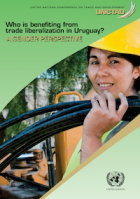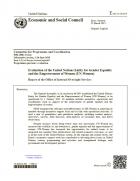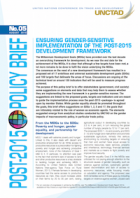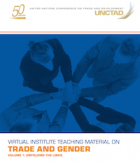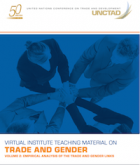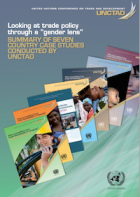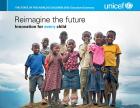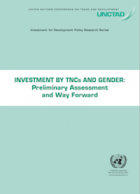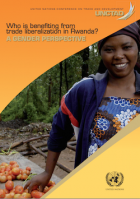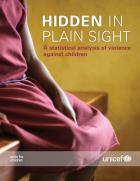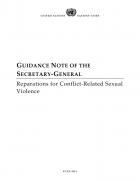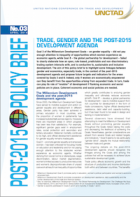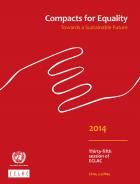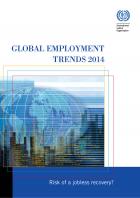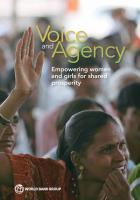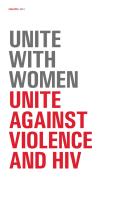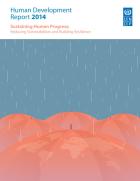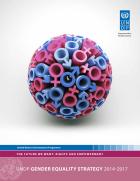Date:
This report encourages the reader to take into account the complexities of the trade and gender link and its numerous, and sometimes hidden, connections with the micro and macro components of economic and development processes. The research also highlights that Uruguay’s legal framework as well as social norms and stereotypes contribute to the role that women play in the labour market and society.
Date:
In 2014, the Inspection and Evaluation Division of the Office of Internal Oversight Services undertook an evaluation of UN Women’s normative work. The objective of the evaluation was to determine, as systematically and objectively as possible, the relevance and effectiveness of UN Women in achieving its mandate in support of gender equality through normative support work and its link with operational activities.
Date:
The purpose of this policy brief is to offer stakeholders some suggestions on elements and data that may help them to assess whether they are implementing the new sustainable development framework in a gender-sensitive manner.
Date:
This teaching material explores the consequences of trade for women’s economic empowerment and well-being and the impact of gender inequality on trade.
Date:
The objective of this volume is to explain to readers how to carry out empirical analysis of the impact of trade on gender inequality.
Date:
This paper presents summaries of the seven country case studies undertaken by UNCTAD during the period 2010-2014 on the topic of trade liberalization from a gender perspective. The case studies are on Rwanda, The Gambia, Lesotho, Cape Verde, Angola, Bhutan and Uruguay. The studies are part of UNCTAD’s activities on trade, gender, and development carried out by the organization in accordance with its mandate.
Date:
The State of the World’s Children calls for brave and fresh thinking to address age-old problems that still affect the most disadvantaged children. In particular, the report calls for innovation – and for the best and brightest solutions coming from communities to be taken to scale to benefit every child.
Date:
This report is a preliminary assessment of the gender-specific impact of transnational corporations. It focuses mainly on gender equality, spanning the wage and employment impact of TNCs, and the related potential for women's empowerment.
Date:
The study, Who is Benefiting from Trade Liberalization in Rwanda? A Gender Perspective, attempts to assess the impacts of Rwanda's trade policies on women and examines their role the country's economy. The report found that Rwanda has acknowledged the importance of gender equality and women's empowerment as tools for development and has made remarkable advances in furthering the status of women and girls - especially in education and political participation.
Date:
Interpersonal violence – in all its forms – has a grave effect on children: violence undermines children's future potential; damages their physical, psychological and emotional well-being; and in many cases, ends their lives. The report sheds light on the prevalence of different forms of violence against children.
Date:
Pursuant to General Assembly resolution 68/140, the present report provides information on the status of women in the United Nations system during the reporting period from 31 December 2011 to 31 December 2013, including progress made and obstacles encountered in achieving gender balance and up-to-date statistics and recommendations for accelerating progress.
Date:
This note aims to provide policy and operational guidance for United Nations engagement in the area of reparations for victims of conflict-related sexual violence, including activities to advocate for and/or support the design, implementation, monitoring and evaluation of reparation programmes and initiatives directed at victims of conflict-related sexual violence. The note is intended to complement other relevant UN tools and guidance notes, in particular the notes on the UN approach to rule of law assistance and to transitional justice.
Date:
The present report focuses broadly on developments in the United Nations regarding violence against women, its causes and consequences, over approximately 20 years.
Date:
The aim of this policy brief is to highlight some linkages between gender and economics, especially trade, in the context of the post-2015 development agenda and propose future targets and indicators for the areas covered by Goals 3 and 8. Indeed, only if women are economically empowered can they benefit from the opportunities arising from expanded trade. In turn, trade can play its role of “enabler” of development if flanking economic and social policies are in place.
Date:
The document discusses the two major challenges to development in Latin America and the Caribbean today: to achieve greater equality and to make development sustainable for future generations.
Date:
The study offers the latest and regional information and projections on several indicators of the labour market, including employment, unemployment, working poverty, gender gaps and vulnerable employment.
Date:
This report distills vast data and hundreds of studies to shed new light on constraints facing women and girls worldwide, from epidemic levels of gender-based violence to biased laws and norms that prevent them from owning property, working, and making decisions about their own lives. It highlights promising reforms and interventions from around the world and charts an urgent agenda for governments, civil society, development agencies and other stakeholders.
Date:
The AIDS response is producing exciting results and we can already foresee a time when the AIDS epidemic could end. Yet, the promises of science, politics and economic development will not be realized if we do not unite with women against violence as an integral part of the HIV response.
Date:
The 2014 Human Development Report “Sustaining Human Progress: Reducing Vulnerabilities and Building Resilience” shows that overall trends in human development are positive. Yet, people at all ages are also facing threats and challenges to their well-being, including by natural or human-induced disasters and crises.
Date:
Gender equality and the empowerment of women are at the heart of United Nations Development Programme’s (UNDP) development mandate. With this Gender EqualityStrategy 2014-2017, UNDP is well placed to ensure that gender equality and the empowerment of women are integrated into every aspect of its work to support countries to eradicate poverty and reduce inequalities and exclusion.
